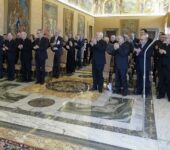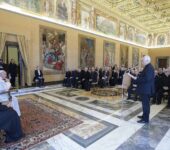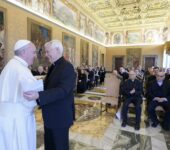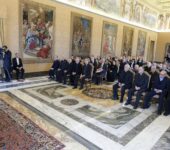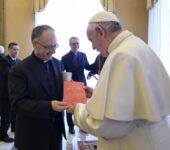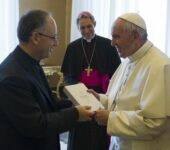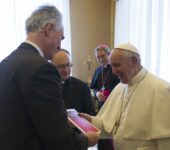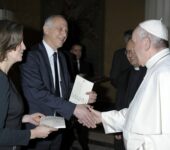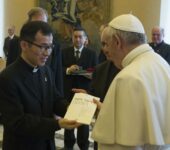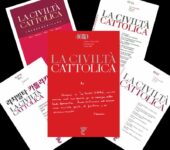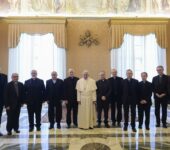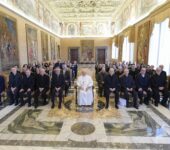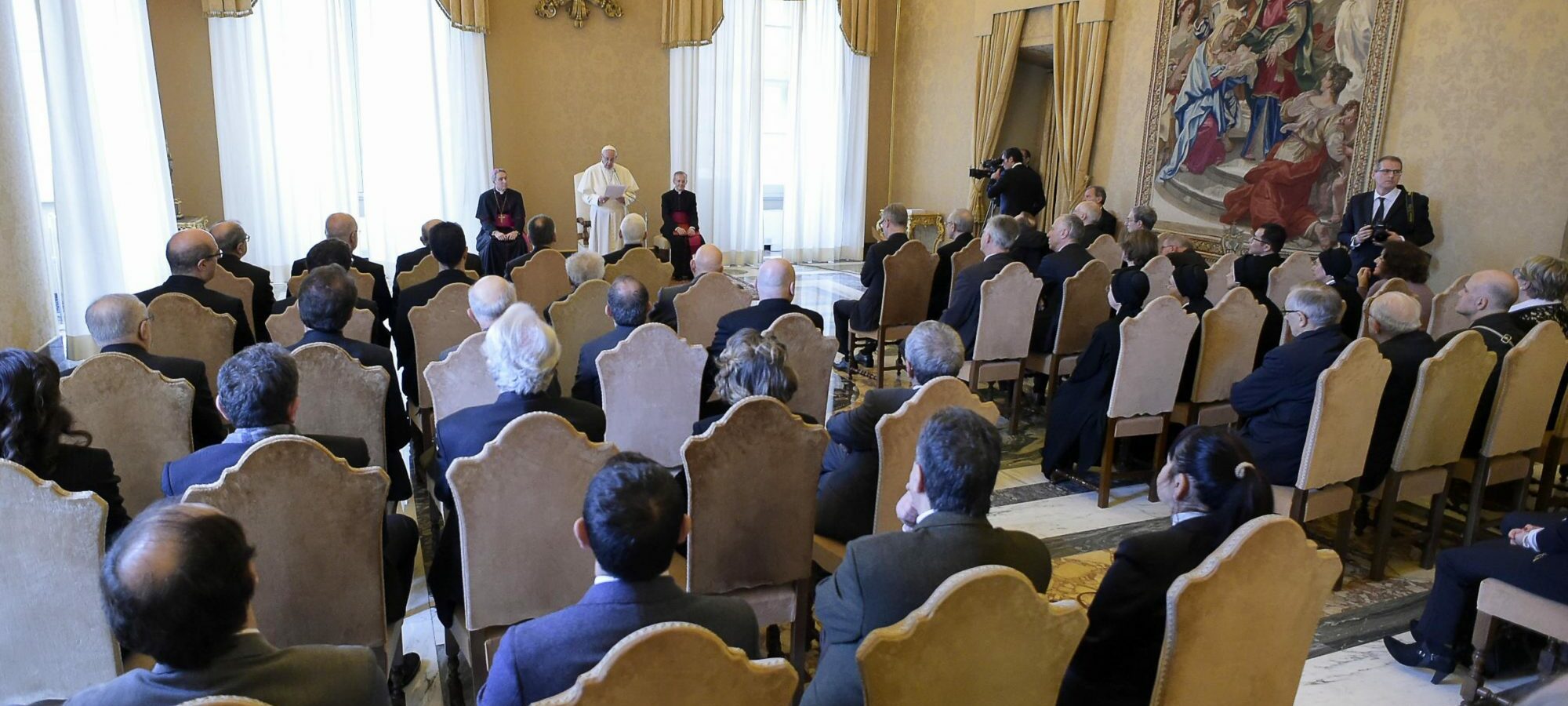
|
|
Consistory Hall
Thursday, February 9, 2017
Dear writers of the College of Civiltà Cattolica, dear lay collaborators,
I am happy to meet with you together with the other Jesuits of your Community, with the sisters and all those who collaborate with you in the life of the magazine and in the administration of the house in which you live. I also greet the editors who from now on will publish your magazine in Spanish, English, French and Korean. I feel here present the whole, broad family of your readers. I find you all happily together on the occasion of the publication of your 4000th issue. It is a truly unique goal: the magazine has completed a voyage of 167 years duration and continues its navigation with courage in open seas.
That’s right: stay in open seas! The Catholic must not be afraid of open seas, must not look for the shelter of safe ports. Above all, as Jesuits, avoid clinging to certainties and securities. The Lord calls us to go out on mission, to go out to sea and to not go into retirement to take care of certainties. Storms are encountered in going to sea and there can be a head wind. And yet you always make the holy voyage in the company of Jesus who says to his own: «Courage, it is I, be not afraid!» (Mt 14:27).
Your navigation is not solitary. My predecessors, from blessed Pius IX to Benedict XVI, meeting with you in audience, have acknowledged many times how your navigation is in the Barque of Peter. This closeness to the Pontiff is always an essential trait of your magazine. You are in the Barque of Peter. It, at times in history—today as yesterday—can be tossed around by the waves and there is nothing surprising about this. But even the very sailors called to row in the Peter’s boat may row in the opposite direction. It has always happened. You of Civiltà Cattolica must be «”expert and courageous rowers” (Pius VII, Bull Sollicitudo omnium Ecclesiarum): therefore row! Row, be strong, even against the head wind! We row at the service of the Church. We row together!» (Homily at Vespers with Te Deum, September 27, 2014). This is the closeness between you and me. And I express my «strong desire that this closeness is not only maintained, but is strengthened» (John Paul II, Discourse to the writers of “La Civiltà Cattolica”, January 19, 1990). Let’s always go forward in our navigation, pushed by the breath of the Holy Spirit who guides us.
4000 issues are not a collection of paper. There is a life within it, made of a lot of reflection, a lot of passion, of struggles sustained and contradictions encountered. But above all, of a lot of work. I know that your former predecessors loved to call themselves «workers». Not «intellectuals» but «workers». I like this definition that is humble, modest and very effective, very much. St Ignatius wants us to be workers in the mystical vineyard. I work in one way, you work in another. But we are together, next to each other. I see you in my work, I follow you, I accompany you with affection. Your magazine is often on my desk. And I know that you in your work never lose sight of me. You have faithfully accompanied all the fundamental passages of my Pontificate beginning with the long interview that I granted to your director in August 2013: the publication of the Encyclicals and the Apostolic Exhortations, giving them a faithful interpretation; the Synods, the Apostolic Voyages, the Jubilee of Mercy. I thank you for this and I ask you to continue on this path of working with me and praying for me.
How many things have happened in the 167 years of your magazine and recounted in your 4000 issues! At every 1000th issue, you encountered the Pope: Leo XIII, Pius XI, Paul VI have celebrated the previous ones. Now here you are with me. And with you there is the Father General of the Society of Jesus, because Blessed Pius IX wanted that the College «depended completely and in everything» on him (Ap. brief Gravissimum supremi). I confirm this custody of Civiltà Cattolica to the Father General precisely because of the specific task that your magazine carries out in the service of the Apostolic See.
And more generally I confirm the original Statues of your magazine, that Pius IX wrote in 1866 instituting La Civiltà Cattolica «perpetually». To read them today we note a language that is no longer ours. But the profound and specific meaning of your magazine is well described and must remain unchanged, namely that of a magazine that is the expression of a community of writers, all Jesuits, who not only share an intellectual experience, but also a charismatic inspiration and, at least in the fundamental core of the writing, the daily life of the community. The variety of topics that you deal with are chosen and elaborated in a consultation among you that requires a frequent exchange (cfr Leo XIII, Lett. Sapienti consilio). The comparison not only on ideas, but even on the way of expressing them and the means adapted to do it is up to you. The center of Civiltà Cattolica is the College of Writers. Everything must revolve around it and its mission.
This mission—for the first time in 167 years—from today expands beyond the linguistic borders of Italian. I am happy to be able to bless the editions of Civiltà Cattolica in Spanish, English, French and Korean. It is an evolution that your predecessors already, at the time of the Council, had in mind, but was never put into effect. For some time already, the Secretariat of State sends copies to all the Nunciatures in the world. Now that the world is even more connected, the overcoming of linguistic barriers will help to better spread the message to a wider radius. This new stage will contribute as well to widening your horizons, and to receiving written contributions from other Jesuits in various parts of the world. The vibrant culture tends to open, to integrate, to multiply, to share, to dialogue, to give and to receive within a people and with other peoples with whom they enter into relationship. La Civiltà Cattolica will be a magazine ever more open to the world. This is a new way of living your specific mission.
And what is this specific mission? It is that of being a Catholic magazine. But being a Catholic magazine does not simply mean that it spreads Catholic ideas, as if Catholicism was a philosophy. As your founder, Fr. Carlo Maria Curci, wrote, La Civiltà Cattolica must not «seem like something from the sacristy». A magazine is truly «Catholic» only if it has Christ’s gaze on the world, and if it transmits it and witnesses to it.
In my encounter with you three years ago, I presented your mission to you in three words: dialogue, discernment, frontier. I reaffirm them today. In the greeting note that I sent to you for the number 4000, I used the image of the bridge. I like to think of Civiltà Cattolica as a magazine that is at the same time «bridge» and «frontier».
Today I would like to add some reflections to deepen what your founders, taken up then by Paul VI, call the “constitutional plan” of the magazine. And I will also give you three “patron’, that is three Jesuits figures to whom to look to move ahead.
The first word is RESTLESSNESS. I ask you a question: has your heart preserved the restlessness of the quest? Only restlessness gives peace to the heart of a Jesuit. Without restlessness, we are sterile. If you want to inhabit bridges and frontiers, you must have a restless mind and heart. Sometimes the sureness of doctrine is mixed with suspicion for research. For you it is not so. The Christian values and traditions are not rare pieces to close up in museum cases. The certainty of the faith is instead the engine of your research.
I give you as a patron St Peter Favre (1506-1546), a man of great desires, a restless spirit, never satisfied, a pioneer of ecumenism. For Favre, it is precisely when difficult things are proposed that the true spirit that moves one to action (cfr Memoriale, 301) is manifested. An authentic faith always implies a deep desire to change the world. Here’s the question we must ask ourselves: do we have great visions and momentum? Are we audacious? Or are we mediocre, and do we content ourselves with laboratory reflections?
Your magazine takes awareness of the wounds of this world, and it identifies therapies. It is a document that tends to understand evil, but also pours oil on the open wounds to heal them. Favre journeyed with his feet and died young from hard work, devoured by his desires for the greater glory of God. You journey with your restless intelligence that the keyboards of your computers translate into useful reflections to build a better world, the Reign of God.
The second word is INCOMPLETENESS. God is the Deus semper maior, the God who always surprises us. This is why you must be writers and journalists of incomplete thought, that is, open and not closed and rigid. Your faith opens your thought. It makes you be guided by the prophetic spirit of the Gospel to have an original, vital, dynamic, vision that is not taken for granted. And this especially today in a world so complex and full of challenges in which the “culture of the shipwreck”—nurtured by profane messianism, relativistic mediocrity, suspicion and rigidity—and the “culture of the trash can”, where everything that doesn’t work as we would like or we throw away what is considered by now useless, seem to triumph.
The crisis is global, so then it is necessary to address our gaze to the dominant cultural convictions and the criteria by which people believe that something is good or bad, desirable or not. Only a truly open thought can confront the crisis and the understanding of where the world is going, of how the more complex and urgent crises, geopolitics, the challenges of the economy and the grave humanitarian crisis tied to the drama of migrations that is the true knot of global politics of our days, are confronted.
Therefore, I give you as a figure of reference the Servant of God Fr. Matteo Ricci (1522-1610). He composed a great Chinese globe depicting the continents and the islands known up to then. Thus, the beloved Chinese people could see depicted in a new form many distant lands that were named and briefly described. Among these Europe and the place where the Pope lived as well. Better yet, the globe served also to introduce the Chinese people to other civilizations. Here, with your articles, you also are called to compose a “globe”: you show the recent discoveries, you give name to places, you make known what the meaning of “Catholic civilization” is, but you make known as well to Catholics that God is at work even outside of the confines of the Church, in every true “civilization”, with the breath of the Spirit.
The third word is IMAGINATION. This is the time of discernment in the Church and in the world. Discernment is always realized in the presence of the Lord, looking at the signs, listening to things that happen, the feelings of people who know the humble way of the daily stubbornness, and especially of the poor. But we need to penetrate ambiguity, we need to enter in there, as the Lord Jesus did assuming our flesh. Rigid thought is not divine because Jesus has assumed our flesh, which is not rigid except after death.
This is why I like poetry so much and, when it is possible for me, I continue to read it. Poetry is full of metaphors. Understanding metaphors helps to make thought agile, intuitive, flexible, acute. Whoever has imagination does not become rigid, has a sense of humor, always enjoys the sweetness of mercy and inner freedom. He or she is able to throw open broad visions even in restricted spaces as Brother Andrea Pozzo (1642-1709) did in his pictorial works, imaginatively unlocking open spaces, domes and corridors, there where there are only roofs and walls. I also give you him as a figure of reference.
Cultivate then in your magazine the space for art, literature, the cinema, theater and music. So you have done since the beginnings, from 1850. Some days ago, I meditated on the picture by Hans Memling, the Flemish painter. And I thought about how the miracle of the delicacy that there is in his picture represents his people well. Then I thought of the verses of Baudelaire on Rubens there where he writes that la vie afflue et s’agite sans cesse, / Comme l’air dans le ciel et la mer dans la mer (“Life moves and whirls incessantly, / Like the air in the sky and the tide in the sea”). Yes, life is fluid and is agitated relentlessly like the air in the sky and the sea in the sea. The thought of the Church must recover genius and understand ever better how man and woman are understood today to develop and deepen right teaching. And this genius helps us to understand that life is not a painting in black and white. It is a painting in colors. Some clear and others dark, some soft and others vivid. But in any case nuances prevail. And this is the space for discernment, the space in which the Spirit agitates the sky like the air and the sea like the water. Your task—as Blessed Paul VI asked—is that of living the confrontation «between the burning needs of man and the perennial message of the Gospel» (Discourse on the occasion of the XXXII Gen. Congr. Of the Society of Jesus, December 3, 1974). And you already carry these burning needs inside yourselves, and in your spiritual life. Give them the most adequate forms, even new ones, to this confrontation, as the way of communicating, that changes with the passing of time, requires today.
I hope that La Civiltà Cattolica, also thanks to its versions in other languages, can reach many readers. The Society of Jesus supports this work so ancient and precious, rather unique for its service to the Apostolic See. It is generous in providing it with capable Jesuits and it spreads it there where it is most opportune. I think above all of the educational formation center and schools, in particular for the formation of teachers and parents. But also in centers of spiritual formation. I recommend circulation particularly in seminaries and formation centers. The bishops support it. Its connection with the Apostolic See makes it, in fact, a unique magazine of its kind.
I conclude this our encounter thanking you for the witness that you give. I entrust all of you here present to the intercession of Our Lady of the Street and to St Joseph, imparting on you my Apostolic Blessing. Thanks.
- Il saluto del Collegio degli scrittori e dei collaboratori de “La Civiltà Cattolica” all’ingresso di papa Francesco
- Il Superiore generale della Compagnia di Gesù, p. Arturo Sosa, mentre introduce dell’udienza
- Il saluto tra papa Francesco e p. Sosa
- Un momento del discorso del Santo Padre
- Il direttore de “La Civiltà Cattolica”, p. Antonio Spadaro, dona a papa Francesco una copia del quaderno numero 4000 della rivista
- P. Spadaro offre al Santo Padre anche una copia del volume celebrativo della Rizzoli, con la storia de “La Civiltà Cattolica” e tutti i testi dei discorsi rivolti dai pontefici al Collegio degli scrittori
- Papa Francesco riceve in dono una copia della nuova edizione in lingua spagnola de “La Civiltà Cattolica”
- Papa Francesco riceve in dono una copia della nuova edizione in lingua francese de “La Civiltà Cattolica”
- Papa Francesco riceve in dono una copia della nuova edizione in lingua coreana de “La Civiltà Cattolica”
- Le copertine delle 5 edizioni de “La Civiltà Cattolica”: in lingua italiana, spagnola, francese, inglese e coreana
- Papa Francesco con il Collegio degli Scrittori de “La Civiltà Cattolica”
- Papa Francesco con tutti i partecipanti all’Udienza








